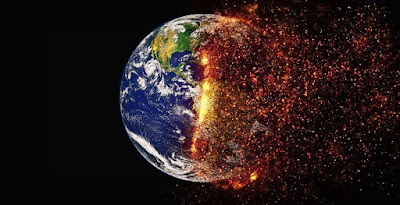The impact of water scarcity on armed conflict - part two
The conflict over oil has formed a large area of wars and events that took place in the world many decades ago and continues to this day, but the conflict over water can be more severe and deadly because water is ultimately the basis of life, due to the limited water on the The surface of the earth and its increasing shortage as a result of global warming (global warming), and there is no doubt that the early realization of the importance of water will greatly affect the conflicts and disputes that may occur in the future because it is a matter of existence, and the understanding of security as the subject of military defense internally or Externally, it is a superficial, shallow and naive concept of the major issue of security, which is the issue of food security, of which water is its main and fixed axis. There are many non-military aspects closely related to the issue of national security, and certainly the issue of food and economic security and the issue of water on top of those aspects. The most important one.
If we take the Arab world as a model, there is a large food gap amounting to about (60 billion dollars) annually, which is the difference between exports and imports, which constitutes a major problem for self-sufficiency in the region because whoever owns his food owns his decision, so it is a question of sovereignty and this food issue It is necessarily associated with the issue of water, as water is the basic element for agriculture, which is capable in any case to bridge that food gap. Water also enters an important element in industry through cooling thermal plants and power generation.
What increases the possibility of conflicts and clashes between the countries of the world because of water is that most of the rivers in the world originate from one country, pass from one country and flow into another country, which generates political tensions between these countries over the division of this water and the attempt of each of the countries concerned to use Its influence, its international relationship and its military power to extract the largest possible amount of this water.
Most of the world’s countries receive more than (50%) of their water from outside their borders, i.e. from other countries, according to the international consulting firm PricewaterhouseCoopers (conflicts will intensify due to the water shortage, which is expected to affect two-thirds of the world’s population in 2050). Eleven regions in the world constitute a dispute that may develop into an armed conflict over the control of water and its sources, and the Middle East represents the severity of these regions, from these regions mentioned by the Foundation:
Turkey - Syria - Iraq because of Turkey's exploitation of the waters of the Tigris and Euphrates rivers.
Iran - Iraq are competing for the Shatt al-Arab (the confluence of the Tigris and Euphrates rivers in the Persian Gulf).
Egypt - Sudan - Ethiopia The dispute over the resources of the Nile River.
Egypt - Sudan - Libya - Niger - Chad A dispute over the existence of an underground basin that Libya is working to benefit from.
Mauritania - Senegal - Mali Sharing the waters of the Senegal River.
India-Bangladesh around the Ganges Delta and Brahma Portree.
Uzbekistan - Kyrgyzstan - Tajikistan - Dispute over the Mudariya River, Syrdarya River and the Ural Sea.
And many other disputes over water.

Comments
Post a Comment
Thank you for comment